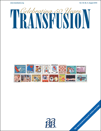An adapted postdonation motivational interview enhances blood donor retention
This study was supported by a supplement to a R01 grant from the National Heart, Lung, and Blood Institute (HL077438).
Abstract
BACKGROUND: Blood donors may hold conflicting thoughts about future donation. While they may perceive the direct benefit to themselves and others, they often report compelling reasons not to give again. As a result the standard encouragements to return may not be sufficient to motivate some donors. This study examined the effects of a postdonation adapted motivational interview (AMI) on blood donor attitudes and repeat donation behavior.
STUDY DESIGN AND METHODS: Donors (n = 215) were randomly assigned to either an AMI or a no-interview control group. Approximately 1 month after their index donation, donors in the AMI group completed a brief telephone interview to clarify individual-specific motivations and values concerning blood donation and address potential barriers. They were then asked to complete questionnaires regarding donation attitudes, anxiety, self-efficacy, and intention to donate. Donors in the control group were also contacted 1 month after donation and asked to complete the same series of questionnaires.
RESULTS: Donors in the AMI group reported greater intention to provide a future donation (F = 8.13, p < 0.05), more positive donation attitudes (F = 4.59, p < 0.05), and greater confidence in their ability to avoid adverse reactions (F = 10.26, p < 0.01). Further, AMI was associated with higher rates of attempted donation at 12 months (odds ratio, 2.48; 95% confidence interval, 1.27-4.87).
CONCLUSION: Application of an AMI may be an effective strategy to increase the donor pool by enhancing retention of existing donors.




